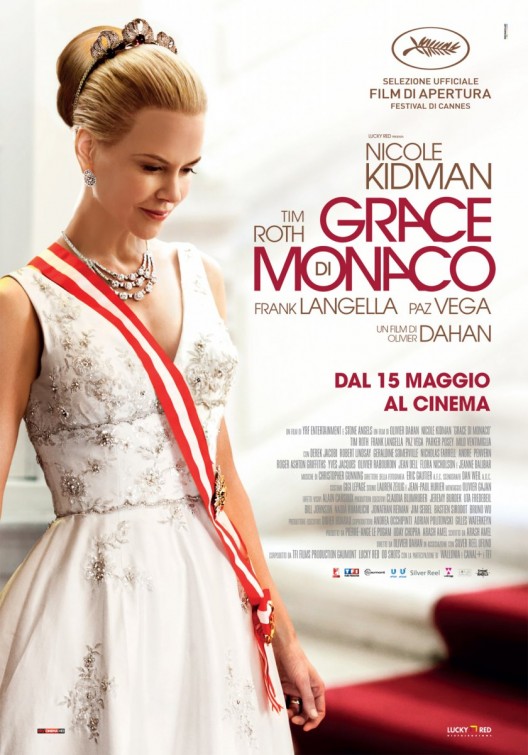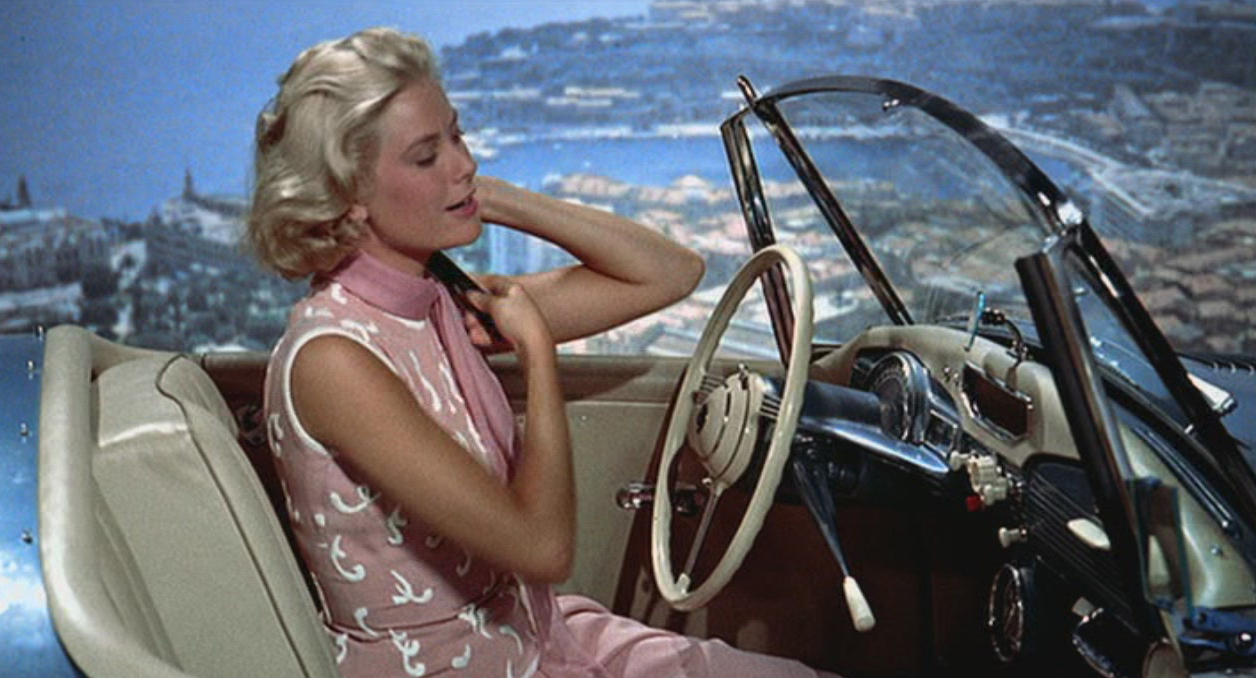 Diana Drumm is reporting for The Film Experience from Cannes
Diana Drumm is reporting for The Film Experience from Cannes
As you should know by now, thanks to mid-screening tweets, prompt reviews and Nathaniel being awesome as always, Grace of Monaco is bad. So bad that Cannes critics are being divided into indifference, dislike and rollicking hate. I, for one, fall into a fourth category, that of the now-jaded hopeful still grappling with how it all could have gone so horribly wrong. It’s from the director behind La Vie En Rose and... NICOLE KIDMAN. And I do mean grappling, I’ve barely eaten since that lovely sandwich or slept since nodding off on the Nice-Cannes commuter and my attempts at writing an actual review have gone the way of nonsensical jibberish with many ‘rather’s, ‘while’s and ‘thereby’s. Plus I’ve missed multiple opportunities to stow-away on champagne and celebrity-laden yachts. (Well, maybe not, but you get the gist – me, bedraggled by disappointment.) It could be the jet lag typing, but I wish I could go back to the before time, before I knew for certain that Grace of Monaco was a bad film.
For weeks, I’ve been hushing naysayers, lah-lah-lahing the latest Weinstein cut rumors and ignoring the strawberry blonde Nicole Kidman as Grace press photos. With its synopsis reading like My Week with Marilyn meeting Evita for cucumber sandwiches to discuss an upcoming charity event and swap stories about who was handsier, Ari Onassis or Alfred Hitchcock, I kept telling myself that whether Grace was good or bad, it would be nice to see Grace Kelly’s story onscreen. I was wrong, so wrong. This isn’t to say that the film’s downright awful, or even amongst Cannes’ worst (Splitting Heirs, anyone?), but as someone with only love in her heart would say, it’s not that I’m angry, it’s that I’m hurt and disappointed.
Princess Grace and Old Hollywood fairy tales after the jump...
Some of you may be asking why should I or you or anybody care about a girl from the Main Line who made a few films of varying quality and married the prince of the Europe’s smallest principality. Some diehard Judy Garland fans may even be crossing themselves at the mere mention of her name. Honestly, I can’t answer for you, but for me, it’s because in my heart of hearts Grace Kelly represents a naturally strong, authentic beauty (albeit with a coached accent) that succeeded, however briefly, in a cruel, weak and tragic world. She may not have wholly lived up to that ideal in each and every one of her actions, but can you name anyone who has?
And I’m not referring to her pointed chin or her slender legs or her blonde hair and blue eyes, I’m talking about the woman who made her way from a dysfunctional albeit wealthy family to the Barbizon Hotel to Beverly Hills to Monaco through sheer gumption and magnetism. Along the way, she may have slept around (Clark Gable?), ruined a few marriages (Ray Milland?), broken a few hearts (Bing Crosby?) and made a questionable movie or two (I love Stewart Granger, but have yet to make it all the way through Green Fire.), but her lasting legacy is that of a woman who wouldn’t let anyone stand in her way and who tried to make the world a better place in the only way she knew how. (Funnily enough, that last bit echoes the sentiment of a climactic speech made by Nicole Kidman’s Grace Kelly in Grace of Monaco, but more on that later.)

So when Grace of Monaco opened the festival this Wednesday and the scathing reviews began to roll out, it was like we let Grace Kelly down. We let our princess down, America’s and Hollywood’s, and in France no less.
While the opening credits rolled, there was no clear sign of the iceberg up ahead. And then emblazoned on the screen was a very well known, widely referenced quote from Kelly...
The idea of my life as a fairy tale is itself a fairy tale”
Kidman reads it aloud in voice-over. I could feel my eyes roll. Whereas Kidman had transformed her voice into a nearly unrecognizable gruffness for her role as war correspondent Martha Gelhorn in the HBO movie Hemingway & Gelhorn, she apparently couldn’t be bothered to put on Kelly’s own put-on Mid-Atlantic accent to read Kelly’s own gosh darn quote. Well maybe this was some attempt at a meta introduction, perhaps a Kidman tribute of sorts before falling so deeply into the character that we’d forget it was her not Kelly on the big screen? Nope, no sirree, Bob. For the rest of the film, Nicole Kidman has her usual pithy, slightly Brit-sounding accent.
Lo! What light through Grace of Monaco’s first frame breaks? It is a studio soundstage and Grace is with Frank Sinatra in a car. Arise fair Grace, and kill my worrisome doubts…

Put less pretentiously, the film opens with Grace Kelly wrapping her final scene on High Society, the one where her Tracy Lord drives Sinatra’s Mr. Connor through the Pennsylvania countryside. The director calls cut, the crew begins to applaud and Grace gets out of the car, manicured blonde curls and all. As the figure turns to the camera, her face is revealed and Kidman’s highly emotive eyes betray her Kelly guise… That being said, who in the world could have pulled off playing Grace Kelly? Robin Wright pre or post Penn? A more emotive January Jones? A less simmering Michelle Pfeiffer? Feel free to share any suggestions, enlightening or otherwise, in the comment section below.
 Marnie (1962) which Hitchcock wanted Grace Kelly for...From there, the script falls down a wormhole of name and factoid-dropping, trying to touch on every aspect of Grace Kelly’s life in Monaco (from memories of Ocean City, N.J. to riding horses with Maria Callas to Charles de Gaulle threatening to “send Monaco back to the Dark Ages!”) with Kidman trailing behind on faltering missteps (her face winding tighter and her eyes looking more frazzled by the scene). When Kelly joins in a heated political discussion on Ari Onassis’s yacht, Kidman’s delivery of meant-to-be spirited comebacks (see Kelly going back and forth with Cary Grant in To Catch A Thief) come off as immaturely snippish retorts. While reading lines from Marnie into a gilded mirror, she repeats that film’s infamously campy “If you touch me again, I’ll die” line over and over until the words turn into an unbelievably exasperated whimper. In the film’s big climax at Monaco’s yearly Red Cross ball, Grace Kelly’s moving speech disintegrates into a rambling stream-of-consciousness about love and beauty conquering all, resembling Jacqueline Bisset’s acceptance speech at last year’s Golden Globes much more than the intended tide-changing denouncement of French involvement in Monaco’s government. Yes, Kelly could be haughty, vulnerable, and even desperate onscreen (see all three sides opposite Louis Jourdan in The Swan), but Kidman’s Grace crashes into strung out territory. Kidman loses Kelly’s healthy, sturdy, All-American glow and withers against the imposing pretenses of minor European aristocracy and diplomats. This is not our Grace.
Marnie (1962) which Hitchcock wanted Grace Kelly for...From there, the script falls down a wormhole of name and factoid-dropping, trying to touch on every aspect of Grace Kelly’s life in Monaco (from memories of Ocean City, N.J. to riding horses with Maria Callas to Charles de Gaulle threatening to “send Monaco back to the Dark Ages!”) with Kidman trailing behind on faltering missteps (her face winding tighter and her eyes looking more frazzled by the scene). When Kelly joins in a heated political discussion on Ari Onassis’s yacht, Kidman’s delivery of meant-to-be spirited comebacks (see Kelly going back and forth with Cary Grant in To Catch A Thief) come off as immaturely snippish retorts. While reading lines from Marnie into a gilded mirror, she repeats that film’s infamously campy “If you touch me again, I’ll die” line over and over until the words turn into an unbelievably exasperated whimper. In the film’s big climax at Monaco’s yearly Red Cross ball, Grace Kelly’s moving speech disintegrates into a rambling stream-of-consciousness about love and beauty conquering all, resembling Jacqueline Bisset’s acceptance speech at last year’s Golden Globes much more than the intended tide-changing denouncement of French involvement in Monaco’s government. Yes, Kelly could be haughty, vulnerable, and even desperate onscreen (see all three sides opposite Louis Jourdan in The Swan), but Kidman’s Grace crashes into strung out territory. Kidman loses Kelly’s healthy, sturdy, All-American glow and withers against the imposing pretenses of minor European aristocracy and diplomats. This is not our Grace.
To boil the film down, Grace of Monaco is a hodge podge of dysfunctional domestic drama, political intrigue and royal biopic, riddled with clichés (a flamboyant count helps make-over Grace), ill-fitting cultural references (a red carpet crowd cheers Robert McNamara), historical inaccuracies (little Caroline would not stumble after her cat into Daddy’s meeting with French ministers) and lackluster emotional breakdowns (Prince Rainier knocks over a glass, smashing it to pieces - what a hothead!).
Onto the other performances…
Tim Roth captures Prince Rainier’s look of the stooped over, had many rare steaks and caviar-crusted canapes in his life, aristocrat. Frank Langella plays the imposing royal chaplain Father Tucker who regularly doles advice to domestically and communicatively challenged Grace and Rainier, acting as the royal couple’s earpiece and the screenwriter’s expository mouthpiece. (Sidebar: I want to make Langella saying “Gracie” my new phone notification noise. How do I make this happen? Anyone?) Rarely seen outside of British television Robert Lindsay plays Ari Onassis, carrying the tan and uncouthness well in the bit part. The ever up-and-coming Paz Vega (how many new talent lists has she been on?) hits her stride as Maria Callas. Like Ari, it’s a small role but she manages to steal each of her scenes and make you wonder why Dahan didn’t direct a Callas biopic instead. Derek Jacobi lends his thespian quality to the Mister Manners Count who helps Kelly become more in tune with Monaco’s customs and her own emotions through cue cards (seriously, there are cue cards that read “confidence” and “regret.”). Oh, and lest I forget, bespectacled Parker Posey plays the indomitable lady-in-waiting Maude who fuels Kelly’s growing paranoia by calling out every one of Kelly’s protocol mistakes (“Madame, you can’t bend down.”) and snooping through her highness’s bedroom.

While director Olivier Dahan’s previous film La Vie en Rose heightened the heartbreaking tragedy of Edith Piaf’s personal life through a sweeping narrative, stringing together key moments of her singing career (which set Marion Cotillard on the international map and led to her Oscar win), Grace of Monaco deadens the romantic idyll of Grace Kelly’s legacy by examining her transition from bored housewife to national figurehead with brief glimpses of her former stardom serving more as distractions rather than serving the overall narrative (which led to Nicole Kidman being thoroughly canned at Cannes). The film flip-flops through Grace’s regret at leaving Hollywood and “her art” to her clinging at the constancy of marriage and monarchy. As the film pushes towards dismantling the fairytale image of the Kelly-Grimaldi “love match” and the supposed serenity of Her Highness, it buckles under the weight of juggling the serene visage of Princess Grace and the behind-closed-doors insecurities of Grace Kelly, never quite making it to anything resembling either the Grace of the silver screen or public imagination.
And now onto the rest of the festival, with future diary entries to be much shorter and hopefully filled with more films and anecdotes than bittersweet ramblings.

Day 1 Arrival & Opening Night | Day 3 Mr Turner & Timbuktu | Day 4 Amour Fou & The Blue Room | Day 4 pt 2 The Homesman Press Conference | Day ??? The Homesman Review
 Diana Drumm, who recently completed a stint as one of 8 young critics to take part in the 2nd annual NYFF Critics Academy became a member of our team this February. You can follow her on Twitter or visit her home page. See her previous posts for The Film Experience here.
Diana Drumm, who recently completed a stint as one of 8 young critics to take part in the 2nd annual NYFF Critics Academy became a member of our team this February. You can follow her on Twitter or visit her home page. See her previous posts for The Film Experience here.
